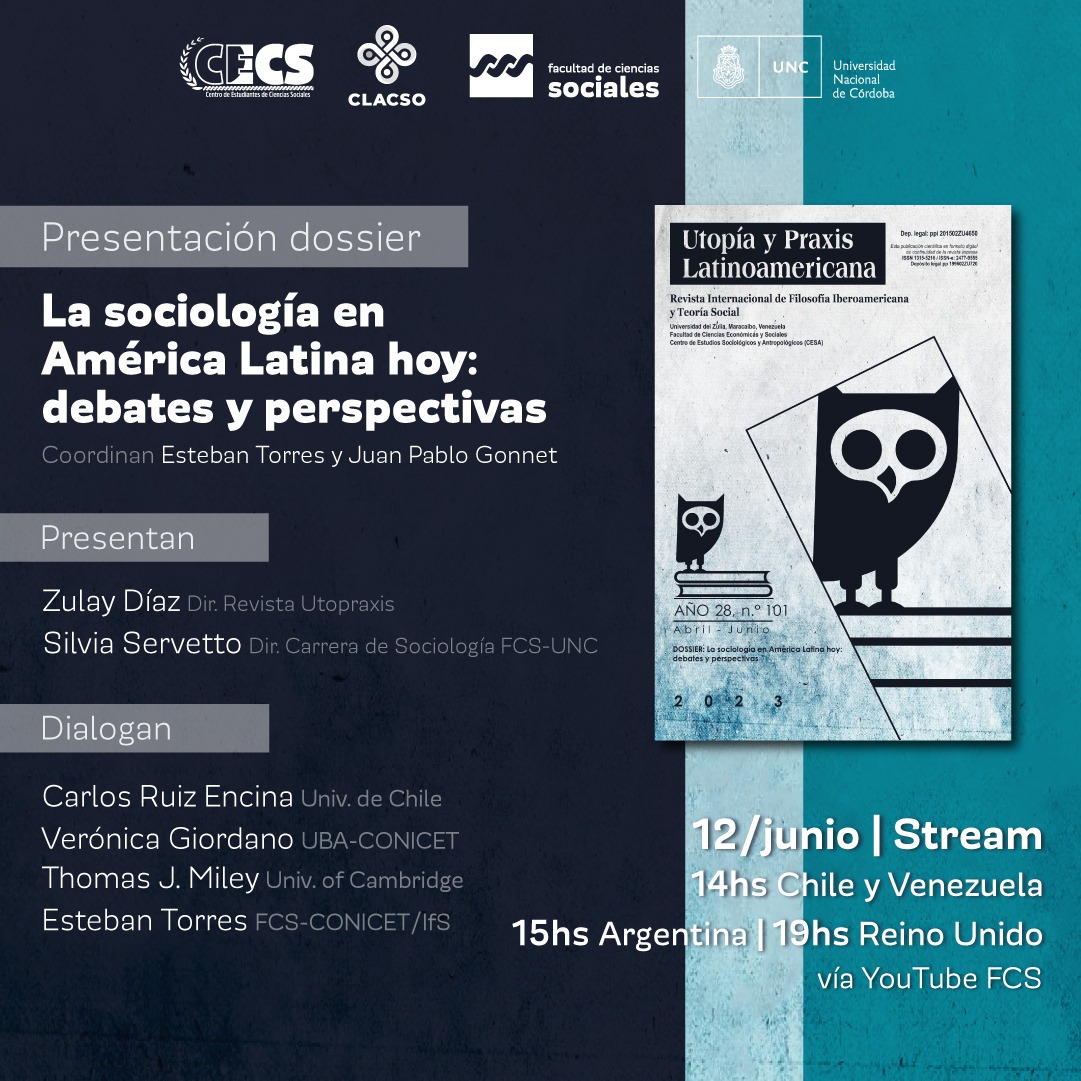Más allá de la imaginación política y la teoría crítica eurocéntricas / Beyond political imagination and eurocentric critical theory
Resumen
RESUMEN
Este texto analiza las dificultades que sobre todo a lo largo de los últimos treinta años persiguen al pensamiento crítico de raíz occidental. Tres de estas dificultades suponen un dilema en la medida en que se producen en el ámbito de la propia imaginación política en que se asienta la teoría crítica y también, en última instancia, la política emancipadora. Otras tres se refieren al impacto de las perplejidades y los impases políticos en la construcción de teoría. En conjunto, estas dificultades exigen cierta distancia respecto a la tradición crítica eurocéntrica, lo que plantea el desafío de pensar desde las epistemologías del Sur, las cuales ofrecen un diagnóstico crítico del presente que tiene como elemento constitutivo la posibilidad de reconstruir, formular y legitimar alternativas para una sociedad más justa, igualitaria, democrática y libre.
ABSTRACT
This text analyzes the difficulties that, above all, over the last thirty years, pursue western critical thinking. Three of these difficulties suppose a dilemma as they take place in the scope of the own political imagination in which the critical theory and the emancipatory policy is based. Three others refer to the impact of perplexities and political impasses in the construction of theory. Together, these difficulties demand a certain distance from the Eurocentric critical tradition, which poses the challenge of thinking from south epistemologies, which offer a critical diagnosis of the present that has as a constitutive element the possibility of reconstruction, formulating and legitimating alternatives for a more just, democratic and free society.
Citas
BECKER, M. (2006). “Mariátegui, the Comintern, and the Indigenous Question in Latin America,” Science & Society, 70-4, 450-479.
CESAIRE, A. (1956). Lettre a Maurice Thorez. Paris: Presence Africaine.
CHATTERJEE, P. (1993). The Nation and its Fragments. Princeton: Princeton University Press.
CONGRESS OF THE PEOPLE (1982). “The Freedom Charter (1955)”, in Bragança, Aquino; Wallerstein, I. (ed.), The African Liberation Reader, vol 2: The National Liberation Movements. London: Zed Books, 81-87.
FANON, F. (1963). The Wretched of the Earth (Pref. by Jean-Paul Sartre), New York: Grove.
FANON, F. (1967). Black Skin, White Masks, New York: Grove.
FREYRE, G. (1946). The Masters and the Slaves, New York: Alfred A. Knopf.
García Linera, Á. (2009). La potencia plebeya: acción colectiva y identidades indígenas obreras y populares en Bolivia, Bogotá: Siglo del Hombre.
HALL, S. (1985). “Authoritarian Populism, a Reply to Jessop et al”, New Left Review, 151, May-June 1985: 118-119.
HOLLOWAY, J. (2002). Change the World without Taking the Power: The Meaning of Revolution Today. London: Pluto.
HOUNTONDJI, P. (ed.) (1997). “Introduction”, in Hountondji, Paulin J. (ed.), Endogenous Knowledge. Dakar: CODESRIA.
LÖWY, M. (2005). “Introdução: nem decalque nem cópia: o marxismo romântico de José Carlos Mariátegui,” in J. C. Mariátegui, Por um socialismo indo-americano: ensaios escolhidos, Rio de Janeiro: UFRJ.
MAGUBANE, B. (2007). Race and the Construction of the Dispensable Other. Pretoria: UNISA Press.
MAMDANI, M. (1996). Citizen and Subject: Contemporary Africa and the Legacy of Late Colonialism, Princeton: Princeton UP.
MANDELA, N. (1982). “I Am Not a Communist”, in Bragança, Aquino; Wallerstein, Immanuel (ed.), The African Liberation Reader, vol 2: The National Liberation Movements. London: Zed Books, 91-95.
MARIÁTEGUI, J. C. (1974 [1925]). Ensayos escogidos, Lima: Universo.
Mudimbe, V. Y. (1988). The Invention of Africa: Gnosis, Philosophy, and the Order of Knowledge, Bloomington: Indiana UP.
NASH, A. (1999), “The moment of western Marxism, in South Africa”, Comparative Studies of South Asia, Africa and the Middle East, 19(1): 61-72.
NZO, A. (1982). “Our Anti-Imperialist Commitment”, in Bragança, Aquino; Wallerstein, Immanuel (ed.), The African Liberation Reader, vol 2: The National Liberation Movements. London: Zed Books, 2-5.
SANTOS, B. de S. (1995). Toward a New Common Sense: Law, Science and Politics in the Paradigmatic Transition. New York: Routledge.
SANTOS, B. de S. (2002). Toward a New Legal Common Sense. Law, globalization, and Emancipation. London: Butterworths
SANTOS, B. de S. (2005). Foro Social Mundial. Manual de Uso. Barcelona: Icaria.
SANTOS, B. de S. (2006). A Gramática do Tempo. Oporto: Afrontamento.
SANTOS, B. de S. (org.) (2007a). Another Knowledge is Possible. Beyond Northern Epistemologies. London: Verso.
SANTOS, B. de S. (2007b), "Socialismo del siglo XXI", Educación Superior. Cifras y Hechos, 31-32, 62-63
SANTOS, B. de S. (2008a). “¿Por qué se ha vuelto tan difícil construir una teoría crítica?”, in Boaventura de Sousa Santos, Conocer desde el Sur. Para una cultura política emancipatoria. La Paz: Plural Editores; CLACSO; CIDES-UMSA, 17-34.
SANTOS, B. de S. (2008b). “The World Social Forum and the Global Left,” Politics & Society, 36(2) 247-270.
SANTOS, B. de S. (2009). “¿Un Occidente no occidentalista?: La filosofía a la venta, la docta ignorancia y la apuesta de Pascal”, in Salgado, José Gandarilla (org.) La Universidad en la encrucijada de nuestro tiempo. México: UNAM, 323- 366.
SANTOS, B. de S. y CARLET, F. (2010). “The movement of landless rural workers in Brazil and their struggles for access to law and justice,” in Yash Ghai and Jill Cottrell (eds.), Marginalized Communities and Access to Justice, Abingdon: Routledge, 60-82.
SANTOS, B. de S. (2014). Si Dios fuese un activista de los derechos humanos. Madrid: Editorial Trotta.
SANTOS, B. de S. (2015). Revueltas de indignación y otras conversas. La Paz: Stigma.
SANTOS, B. de S. (2016). As bifurcações da ordem. Revolução, cidade, campo e indignação. São Paulo: Cortez.
SANTOS, B. de S. (en prensa). The End of a Cognitive Empire. The Epistemologies of the South coming of Age. Durham: Duke University Press.
SUKARNO (1955). “Address given by Sukarno at the opening of the Bandung conference, 18 April 1955)”, in Asia-Africa speak from Bandung. Djakarta: Ministry of Foreign Affairs, Republic of Indonesia, 19-29.
TROUILLOT, M.-R. (2002). “The Otherwise Modern. Caribbean Lessons from the Savage Slot”, in Knauft, Bruce M. (ed.), Modern Alternatives, Alterities, Anthropologies. Bloomington: Indiana University Press, 220-237.












